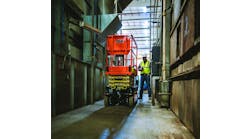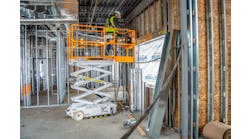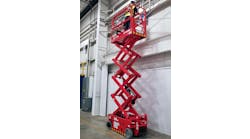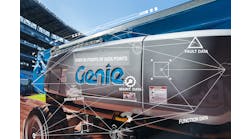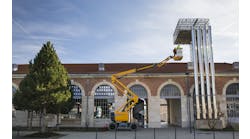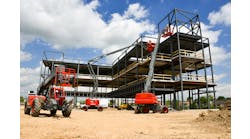If you drive around the great state of Texas — and there's a lot of driving to be done in a state that covers more than 266,000 square miles — you can't avoid the presence of Equipment Depot. With headquarters in Waco and branches in Austin, Beaumont, Brazosport, Corpus Christi, Dallas, Fort Worth, Houston, Laredo, McAllen, San Antonio and Sherman, plus eight additional service depots, Equipment Depot is a major presence in the continental United States' largest land mass and second most populous state.
With an estimated $125 million in 2005 total revenue, almost $35 million from rental, and tracking toward $170 million total for 2006, Equipment Depot, No. 39 on the RER 100, is the biggest regional rental company in the state besides Holt Cat Rental. Equipment Depot operates in 158 Texas counties, eight counties in Oklahoma and two parishes in Louisiana. The area that it covers includes about 85 percent of the population of Texas, which is more than 22 million, and 90 percent of its industrial base.
But who exactly is Equipment Depot? A visitor might visit one branch and think they've got it figured out and then go to another and find something quite different. Equipment Depot is far from being a cookie-cutter operation. It is primarily divided between two principal markets — construction equipment and industrial forklifts — but its equipment mix and marketing methods vary from market to market depending on local management's perception of the best way to approach that market.
Essentially all Equipment Depot branches are strong in the industrial forklift business, but the company develops its construction rental business more slowly, making sure that market has the personnel to give the level of service that is the company's strength.
In Austin, a city that has nearly tripled in size in the past decade, the company has a particularly strong emphasis on construction, with some additional agricultural equipment sales as well. In Waco, the market is primarily industrial, with some rental and agricultural business too. In Corpus Christi, the biggest market is the shipyard, so the company carries larger forklifts that would be little utilized in many of its other markets. In Dallas-Fort Worth, the industrial market is well developed and the construction rental capability is growing fast. Laredo is mostly a forklift business. McAllen specializes in renting to the oil and gas drilling market, with the emphasis on telehandlers and boomlifts. Recently acquired Brazosport, Beaumont and Houston are strong in the industrial area and slowly are branching into construction rental.
To Equipment Depot, rental doesn't mean small stuff. The emphasis is on lifting — industrial and rough-terrain forklifts, telescopic handlers, scissor and boomlifts. And in recent years, Equipment Depot has taken on New Holland dealerships in a number of markets, offering earthmoving equipment such as backhoes, skid-steer loaders, and excavators, compact and larger.
Construction rental and industrial forklifts complement one another in a variety of ways for Equipment Depot. “We might be renting to a construction customer working on an industrial job, and the people at the plant see our equipment and might want to purchase a forklift,” says Melanie Johnson, rental manager at Equipment Depot's Austin branch. “It goes hand in hand.”
“Different factors drive different markets,” says founder and CEO Don Moes. “If 100 percent of your market is in Houston and oil goes down, you're more vulnerable than if you have half your business in Dallas and half in Houston.”
Equipment Depot's diversity helps it withstand economic downturns. “During the downturn of 2001, 2002 and 2003, our construction business held up our industrial business,” says Moes. “The industrial business took a much bigger hit than the construction business because the first thing manufacturers do when times get tough is cut capital spending. In the construction rental business, it leveled out in those years and maybe went down a bit, but it stayed the course.”
Being involved in diverse markets has enabled Equipment Depot to stay the course while some of its competition suffered through construction's ups and downs. “A lot of competitors have come and gone, come back and gone again,” adds T.J. Moes, Austin-based area general manager responsible for all the branches from Austin south, and son of CEO Don. “But we stayed because we had other viable markets that we could tap into when construction rental was on a downturn. We could tap into our forklift business, fall back on our service, our parts department, tractors and everything else we do, and we can keep relationships alive during downturns.”
While Equipment Depot is a major rental player, its approach differs from most rental companies. With more than 275 service technicians, more than 20 per branch, the emphasis on service and maintenance is far beyond what a typical rental company would offer. Equipment Depot is a dealer for the lines of equipment it handles and when it picks up a new line of equipment it approaches it with that mentality. Its staff studies the line thoroughly, makes sure its technicians are thoroughly trained and prepared to take on as much service and repair work as the company can handle.
Equipment Depot's service capability is well known even to its competition, and the company's rental competitors often bring in equipment for warranty work and other repairs. And when an Equipment Depot machine comes off rent, it is subject to a 30-point inspection with service techs devoted specifically to those inspections.
While service techs are sometimes assigned specifically to construction rental or to the industrial forklift business, they are trained enough to help in difference facets of the business as the need dictates.
“If a service tech finishes servicing an industrial account customer and two miles down the road there is a need at a construction jobsite, they can be dispatched directly to the construction job if needed,” says Equipment Depot sales manager James Goldsmith. “Our service department cross-trains our service techs, so they are not just forklift mechanics or scissorlift mechanics, they work on everything.”
The high level of training gives Equipment Depot added flexibility and the ability to handle the normal ebb and flow of business in particular areas without becoming overly burdened. And if a particular department is less busy and its service techs are helping the company in other areas, it avoids being saddled with fixed costs.
Equipment Depot invests heavily in training, which helps the company keep technicians who appreciate the opportunities to expand their knowledge. Consequently, Equipment Depot has quite a few service techs with 20 years or more experience with the company, giving it strong expertise.
“For example, we have a service tech in Waco who is a SkyTrak specialist,” says Equipment Depot marketing manager E.G. White-Swift. “He knows SkyTraks forwards and backwards and no matter where we might have a problem with a machine, we can call him and consult with him and he's probably dealt with the problem or even been involved in helping the factory develop a solution. So we have a great deal of depth in service and the ability to work on a wide range of equipment. We have an incredible knowledge base.”
Outside the box
Having knowledge is important, but freedom to use it creatively is another matter, and not all companies encourage thinking “outside the box.” But coming up with new ideas is actively and aggressively fostered by Moes.
“We are on the 80-20 rule here,” says White-Swift. “About 80 percent of what we do is pretty well set by the management of the company. And about 20 percent is up to the branch to make happen. We make local decisions about how we go to market. We don't just want to dictate. We gear the business model in each individual market to the market that's available to us to go after. That's been a big contributor to our success.”
Moes believes that not only do creative ideas come from all levels and branches, he finds that setting time aside for creative brainstorming has to be promoted by management. One exercise is having employees around the company read a book with full days of discussion set aside in each branch to discuss it.
Moes recently found an out-of-print book by business writer Guy Kawasaki called “How to Drive Your Competition Crazy,” which is about the process of coming up with “outside the box” ideas that can help a company competitively. Moes scoured eBay and other Internet sites to find copies of the book and passed them around the company. Dates are scheduled at each branch to spend an entire day discussing the book and coming up with creative ideas for Equipment Depot. Moes hired a facilitator to direct the workshops.
“We're trying to create a culture that says, ‘You're allowed to try things,’” says Moes. “We encourage you to do it.”
The workshops are held in groups of 21 at a branch. Each of the participants is asked to come up with three new ideas. In the workshop, the groups of 21 are divided into three groups of seven and each group is responsible to decide on three main ideas out of the 63 brought to the table.
“So we come up with nine ideas on how to drive your competition crazy,” says Moes. “We take those ideas and we try to institute them, putting a plan together in that market, and then we share with the others.”
One of the ideas generated from the book workshops was a rental rewards program, enthusiastically received by Equipment Depot customers, that rewards customers with points, similar to a frequent-flyer awards program, for every dollar spent. The points can be redeemed for trips such as cruises.
“I asked our manager when was the last time we used the word ‘motivate’ in this company,” says Moes. “And they all gave me the same answer, ‘I can't remember.’ We don't need to motivate. If your people are empowered, motivation comes naturally. We need to empower our people to think clearly and make good decisions and follow through.”
Moes also teaches the importance of not being afraid to make mistakes. “I always tell people, ‘If you don't make a mistake, you're not doing anything,’” says Moes. “Just make sure when you make a decision, it's logical. And if it is a mistake, it's not going to be severe enough that it can't be fixed.”
To Moes, being creative and looking for new ideas prevents complacency. “We tend to be reactionary,” says Moes. “We react rather than create. What happens in the rental department? Well, nothing, until the phone rings. So I ask, ‘What if it didn't ring all day, what would you do?’ How about calling customers, how about putting notes in the mail saying, ‘I appreciate your business, give me a call if you need anything.’”
Moes believes creativity can come from employees in all facets of the company. “Who has the most hits with the customers?” he asks. “Not salesmen, but technicians. I want those technicians to think: ‘What can I do when I'm out in the field to make that customer feel better about our service?’ That's what we're trying to do.”
It's still relationships
Equipment Depot is a regional company, inasmuch as Texas, its primary market area, is indeed big enough to be labeled a region. Although the company has strong relationships with suppliers, it faces a challenge regional companies must go the extra mile to overcome — the superior buying power of national rental companies. And as rental customers become more consolidated, just as rental companies do, increasingly jobs are handled by contractors who come from out of state. Those contractors often find the easiest approach to rental is just to contact the national company with which it has an account rather than take the time and effort to set up an account with a local player such as Equipment Depot.
All of that is why establishing strong relationships with customers is key to Equipment Depot's approach to its market. It boils down to simple things. Moes, for example, points to his personal dislike of telephoning a business and not being able to get a real person on the phone. Hence there is a live receptionist at each of Equipment Depot's branches, to provide the personal touch.
The long tenure of many employees — such as Goldsmith (30 years) and Austin rental manager Johnson (24) — enables Equipment Depot to foster long-term relationships with customers.
“People like James and Melanie have tremendous relationships with customers,” says Moes. “It's very common for rental customers just to come in to the branch because they want to meet [Johnson], to introduce themselves. It's the same way with Kevin Harris, our rental manager in Waco. He knows lots of customers, and they'll stop by just to say hello.”
With 40 years as a family-owned company, Equipment Depot has had time to develop relationships. The company began when Moes, who started his career with Clark Equipment, had an opportunity to acquire his own dealership when Central Texas Clarklift became available in 1975 in Waco. Moes liked the city, felt it afforded good business opportunities with a solid industrial base and felt the friendly community would be a good place to raise a family.
“I just had to figure out how I could make a living!” Moes recalls. Making a living, of course, would involve the marketing of forklifts, but also meant the rental business, which interested Moes from the outset. Central Texas Forklift rented forklifts for years and in 1980, Moes acquired a general rental company, with smaller items such as air compressors, generators and welders, as well as skid-steer loaders, backhoes, scissors and booms.
“Rental was a big part of our business from the start,” Moes says. “We just didn't have the cultural mentality of construction rental; we had to gain that. But it wasn't difficult, we grew with it.”
The company continued to use the name Central Texas Clarklift, but found it had two major limitations. One was geographic; the name suggested the company was limited to central Texas, when the potential market area was so much broader. Also there was nothing in the name to let the customer know it was in the rental business.
Moes adopted the name Pro Lift for the rental division, but that name implied it was only an aerial company. Eventually the name Equipment Depot was coined in 1995, broad enough to encompass all aspects of the company's capability, with the name Equipment Depot Rentals used by the rental division.
“You can brand your company name to be what you want it to be,” says Moes. “We love that name, it says something about what we are.”
The company began expanding in 1995 by acquiring other companies, beginning with San Antonio. It acquired the Sherman and Fort Worth branches in late 2002, and the McAllen, Laredo and Corpus Christi facilities in the beginning of 2004.
Equipment Depot added branches in Houston, Beaumont and Brazosport in November 2005 with the acquisition of Southline Equipment. And the acquisitions continue, with Moes currently reviewing more expansion opportunities, including some possibilities beyond the borders of Texas.
All things to all customers?
Despite its multi-faceted capabilities, Equipment Depot's credo is far from being all things to all customers. For example, when it enters a new market, it cautiously assesses what the market needs and what approach would be most successful there. The usual pathway begins with the industrial forklift business and, before launching construction rental, being confident the market would respond and that the company had the service capability in place to give the customers the level of support it offered everywhere else.
For example, Equipment Depot entered the Houston market in November 2005. Seven months later, Moes says, “We're still working on the model. We're definitely going to be in the shooting boom forklift business there, but we haven't decided if we'll be in the construction rental business right away or not.”
Moes explains why Equipment Depot wouldn't automatically plunge into one of the U.S.' hottest construction markets with construction equipment rental. “It's a huge city and there are a lot of logistical challenges,” Moes says. “I want to make sure that that business is real good at what it does primarily before we move on,” referring again to the industrial forklift market.
Before becoming what Moes calls “multi-focused,” he is concerned that the company becomes good at what it is doing before taking on other areas for fear that “you get people running in 18 different directions and not doing anything well.”
That philosophy sums it up for Equipment. Laying the groundwork for its moves, doing things well, not trying to be the biggest. Just trying to be the best at what it does.
Acquired
One might wonder, with all the consolidation that took place in the rental industry in the late 1990s, why Equipment Depot, which was courted by several national rental companies, wasn't acquired. Well, in fact, it was in 2000 by a Netherlands-based firm known as Pon Holdings B.V., ranked as one of the world's 50 largest privately held companies.
“I started looking at selling the company in 1998 because I felt that possibly it was better for the employees rather than have it go through the family transition to the next generation, because there are huge tax issues and implications,” Moes says. “The family members were capable, but I felt that [those other issues would] weigh the company down so much that the company wasn't going to be able to grow for a period of years while it was transitioning with the stock transfers and so on.”
The choice of buyer turned out well, as almost all employees have continued with the company in a transition Moes calls “seamless.” Equipment Depot continues to have, essentially, complete freedom of operation. The parent company owns several other equipment-related businesses in North America as well as Europe, including interest in a major European rental company and a Caterpillar dealership in Europe that is involved in rentals.
“There aren't many former owners still with their companies six years after selling them that can say they really enjoy coming to work,” says Moes. “I'm still having fun.”
Moes wanted to sell to a company that would provide capital and opportunities to the employees without inducing change or layoffs, and it has worked. And Moes has employed the same philosophy when acquiring other companies.
“Local people don't go away when we do acquisitions,” says White-Swift. “We want local managers to be involved in that business. We adapt to the manager and they adapt to us. Those companies were good because of the people that were there.”
“When we made the acquisition [of Southline Equipment] last year, I promised all the employees there would be no layoffs. I promised that if there were people left over in accounting after we consolidated, that we would find them other jobs,” adds Moes. “And that's the way it happened.”
